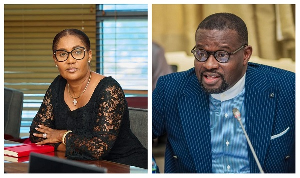... to good performance in external exams
Ho, Feb. 25, GNA - An Educationist on Friday observed that the policy of teaching in vernacular in the first years of education in public basic school could be a setback to their performance in external examinations.
Mrs Lucy Kwapong, Director of Education, Tema Municipality, who made the observation said it is a "known fact that private schools, where the medium of instruction is English from kindergarten, perform better at such exams because the questions are set in English". She was contributing to discussions at a Sensitisation Workshop on the Teacher Education (TED) and GTZ Developed Methodologies in Mathematic, Environmental Studies, Reading and Writing, under the Assistance to Teacher Education Project (ASTEP), in Ho.
Mrs Kwapong said public school pupils had performed badly in such examinations because they lacked the command of the English Language and called for the disparity inherent in the policy to be addressed. Mr Victor Mensah, Acting Volta Regional Director of Education, however, explained that under the policy, English would be taught as a subject, assuring that the policy was functional. He said instructions in vernacular in the early years of education facilitated "a breakthrough to literacy" which forms a bridge to the knowledge of the English Language.
Mr Mensah said there were pupils in class one who could read both vernacular and English fluently adding that let "us not try to emphasise the problems but see them as challenges".
Metro, Municipal and District Directors of Education attended the workshop from the Central, Greater/Accra and Volta regions. Mr Victor Mante, Deputy Director of Teacher Education Division of the Ghana Education Service (GES) said the project was aimed at strengthening and improving the quality of teaching and learning at the lower primary level.
He said the project was also to meet the demand of the Education Sector Report (MOEYS, 2002), which advocated the development of an effective reading culture as key to the enhancement of learning outcomes.
Mr Mante said specialists had been trained to develop subject related methodologies for Primary one to Primary two and manuals on instructional materials for Teacher Training College tutors in five Ghanaian languages for lower primary schools.
He said supplementary readers had also been developed in four titles in Twi, Ewe, Ga, Dagbani, Gonja, Dagare, Likpakpan and Gurune. Mrs Ama Oppong-Dua, Project Coordinator said the GTZ in support of government policy to promote the development of teaching and learning materials in the Ghanaian Languages had devised the project to remain sustainable even after termination.
She said though the teacher's guides and textbooks were in five languages the methodologies were developed in a manner to be replicated and translated into other languages.
General News of Friday, 25 February 2005
Source: GNA
















